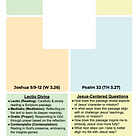Let It Be: The Slow Work of Grace
Luke 13:1-9 (CEB)
1 At that time, some people were present who told Jesus about the Galileans whom Pilate had killed while they were offering sacrifices.
2 He replied, "Do you think the suffering of these Galileans proves that they were more sinful than all the other Galileans?
3 No, I tell you, but unless you change your hearts and lives, you will die just as they did.
4 What about those eighteen people who were killed when the tower of Siloam fell on them? Do you think that they were more guilty of wrongdoing than everyone else who lives in Jerusalem?
5 No, I tell you, but unless you change your hearts and lives, you will die just as they did."
6 Jesus told this parable: "A man owned a fig tree planted in his vineyard. He came looking for fruit on it and found none.
7 He said to his gardener, 'Look, I've come looking for fruit on this fig tree for the past three years, and I've never found any. Cut it down! Why should it continue depleting the soil's nutrients?'
8 The gardener responded, 'Lord, give it one more year, and I will dig around it and give it fertilizer.
9 Maybe it will produce fruit next year; if not, then you can cut it down.'"
We live in a culture that constantly whispers, “Do more. Be more. Prove your worth.”
There’s a pressure humming beneath the surface of our days—a drive to be productive, to climb higher, to reach perfection. And beneath that pressure often lies a deeper fear: If I stop producing, do I still matter?
We’re told that our value is measured by what we achieve. So we climb—rung after rung—chasing a standard that always seems just out of reach. We push, perform, and strive for an elusive sense of “enough.”
There’s an old wooden ladder above the doorway of the Church of the Holy Sepulchre in Jerusalem. It’s been there since 1728. It hasn’t been moved because no one can agree who has the authority to move it. That ladder has become a kind of symbol—not just of religious division, but of how easy it is to get stuck on our own ladders of achievement. We cling to them even when they no longer serve us.
Thomas Merton once wrote,
“People may spend their whole lives climbing the ladder of success only to find, once they reach the top, that the ladder is leaning against the wrong wall.”
Lent invites us to step off the ladder. To stop striving. To trust that healing comes not through self-improvement or superiority—but through surrender. Through grace.
The Problem of Suffering and the Pressure to Produce
📖 Luke 13:1–5
When people ask Jesus about two recent tragedies—a massacre by Pilate and a tower collapse—they’re operating from a common framework: If something bad happened, someone must have deserved it. Jesus refuses that logic. He doesn’t assign blame. Instead, he says, “Unless you repent, you will all die like they did.”
But here’s what’s easy to miss: Jesus isn’t condemning them. He’s inviting them. The word “repent” here is not about shame or punishment—it’s about turning. Reorienting. Like a plant bending toward the light. He is inviting them on the narrow way that leads to abudant life, turning from the wide road that society is traveling on that leads to destruction. Violence begets more violence. Choose Life!
The Greek “you” is plural—Jesus is speaking to everyone. He’s calling for collective transformation, a communal turning from a transactional view of suffering to a posture of grace.
Lent is about letting go of our need for control and choosing instead to trust that life and healing are found—not at the top of the ladder—but in the wilderness. In the quiet. In the soil.
The Fig Tree and the Gardener of Grace
📖 Luke 13:6–9
Jesus tells a parable about a fig tree that hasn’t borne fruit in three years. The landowner says, “Cut it down. Why should it use up the soil?” It’s the logic of efficiency. Of productivity. Of worth measured by output.
How often do we say the same thing to ourselves?
But then the gardener steps in.
“Let it be. Give it another year. Let me tend to it. Let me feed it. Let’s see what happens.”
This is how grace works. Not through punishment, but patience. Not by demanding fruit, but by nurturing roots.
God is not the voice shouting “You should be doing more.”
God is the voice whispering, “Let it be. I’m not finished with you yet.”
The Medicine of Grace
Sometimes what helps us grow isn’t more pressure—but manure. Time. Care. Rest.
Not exactly a glamorous formula for growth, but a deeply faithful one.
Jesus says, “Consider the lilies…” They don’t strive, they don’t compete. They grow because they are rooted. They receive what they need.
Like wildflowers blooming in the desert after rain, grace can bring beauty out of unlikely places. We don’t force transformation—we receive it. We make room for it. We trust its slow unfolding.
“Sometimes the most difficult stranger to welcome is the one inside of us.” Gregory Boyle, Cherished Belonging
Repentance, then, is not about beating ourselves up.
It’s about turning toward the light.
Like a sunflower that instinctively leans toward what gives it life, we are invited to turn toward grace—toward the One who nurtures us patiently.
This is the Big Idea of this sermon, and maybe even of Lent:
We Grow Not by Striving, but by Trusting the Slow Grace of God
Healing and transformation don’t come from striving to be good enough,
but from resting, receiving, and trusting in the slow, nurturing grace of God.
💡 Questions to Ponder
What would it look like to trust the slow work of God in your life?
Where might you stop striving and start receiving?
What if you are already enough?
🌿 Final Word: Let It Be
God is not the landowner demanding more fruit.
God is the gardener—kneeling in the soil, patient and present, working with what is.
This week, instead of asking, “Am I doing enough?”
Ask: “Where is God nurturing me right now?”
And maybe even whisper to yourself:
“What if I am already enough?”
Jesus is saying:
Let it be.
Let me work with you.
Let grace do its slow, faithful work.












Share this post